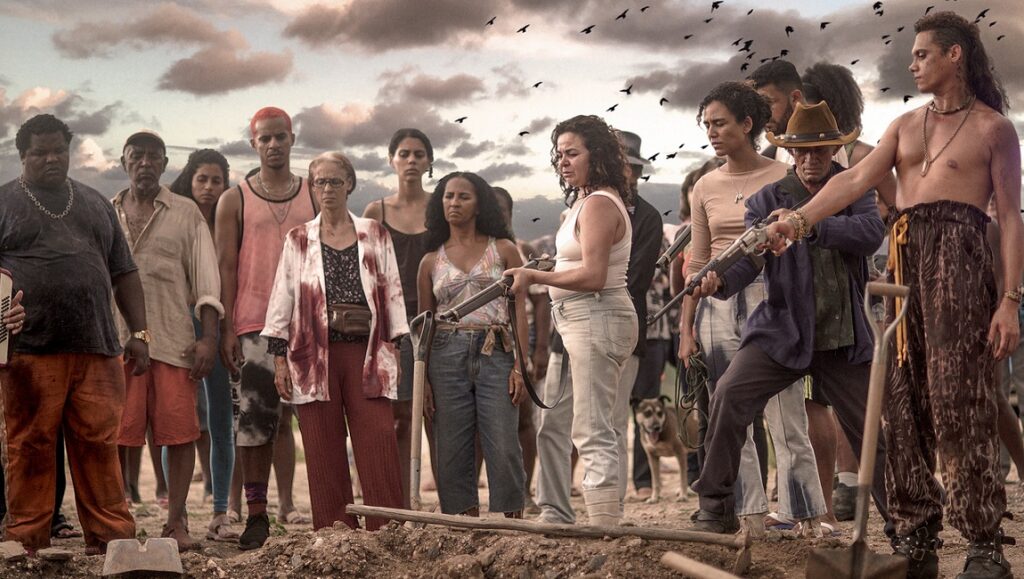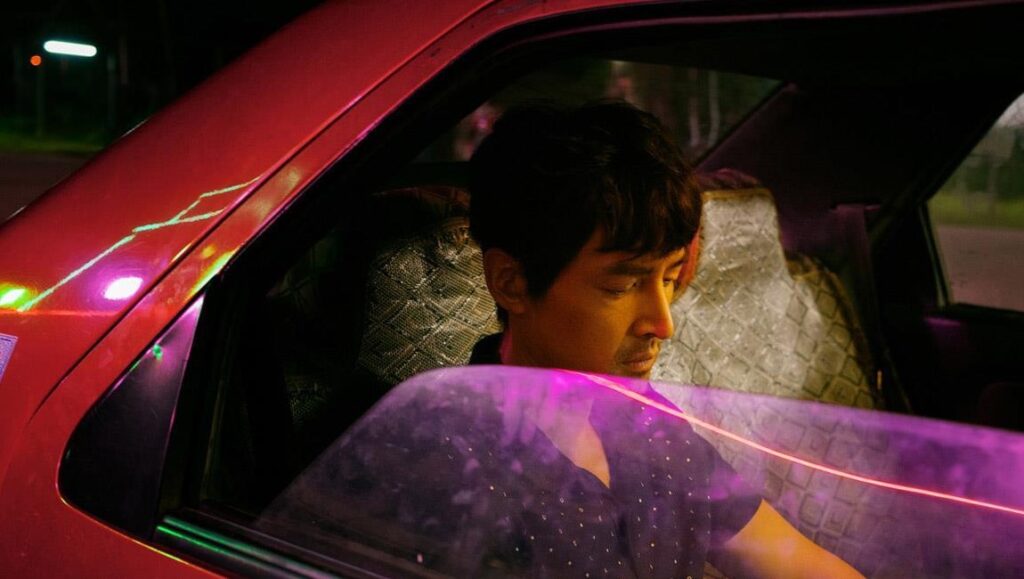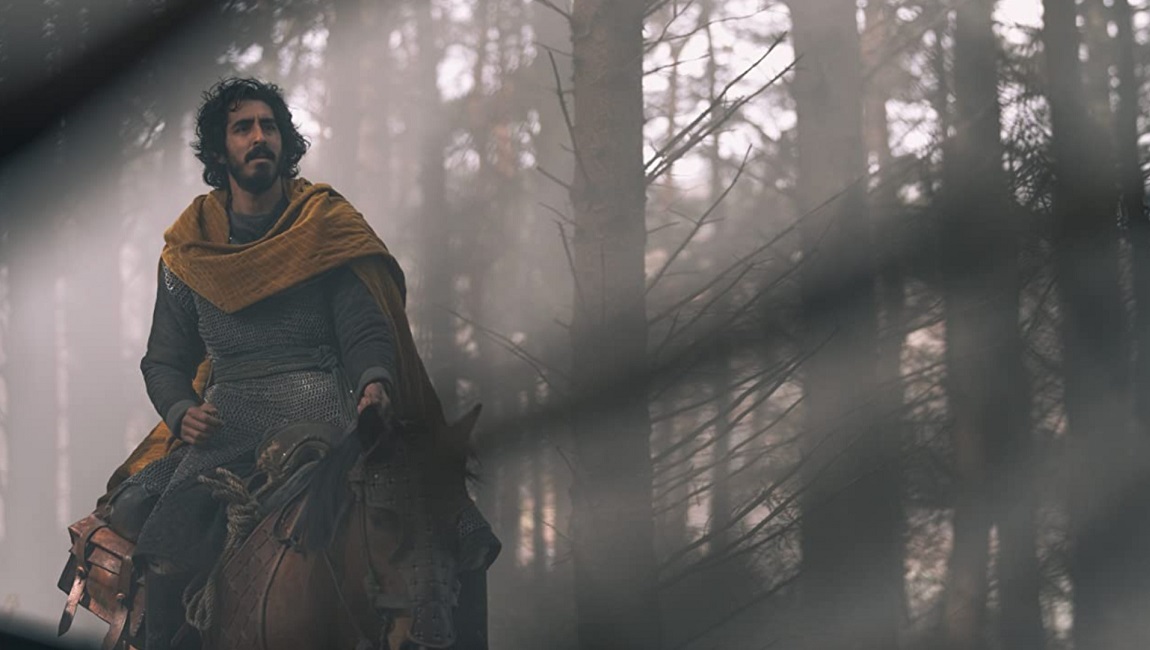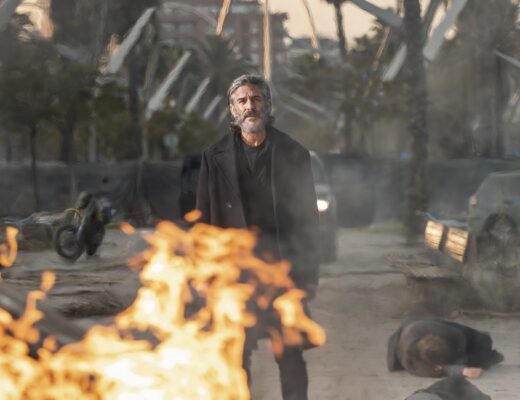OK, so things don’t really vanish anymore: even the most limited film release will (most likely, eventually) find its way onto some streaming service or into some DVD bargain bin assuming that those still exist by the time this sentence finishes. In other words, while the title of In Review Online’s new monthly feature devoted to current domestic and international arthouse releases in theaters will hopefully bring attention to a deeply underrated (even by us) Kiyoshi Kurosawa film, it isn’t a perfect title. Nevertheless, it’s always a good idea to catch-up with films before some… other things happen. | The world is crazy right now, and, rightfully, movie releases have been delayed and theaters have temporarily shuttered. As such, the March issue of Before We Vanish is accordingly abbreviated, reflective of the limited number of films released this month before more extreme safety measures were put into place. But with so many of us afforded ample free time right now and limited possibilities with which to fill it, we figured there was no reason not to deliver pieces on the few films that actually managed to sneak in a release this month. We even go longer than usual on a few because, well, we have the time and space.
First Cow
First Cow is a film of beginnings and endings (and thusly also of returns). Kelly Reichardt‘s second period film marks the return of the 4:3 aspect ratio, once again opening a dialogue with silent cinema to invoke a style of photography long since departed from mainstream cinematic productions. It’s a film of densely textured images, of moss-covered trees and thickets that steep this 19th century portrait of Oregon in vegetation, in untamed land apathetic to the plight of every man and woman that suffuse the frontier. Loosely based on the novel The Half-Life by frequent collaborator Jon Raymond, the story follows the friendship of Cookie, an innocuous man hired as a cook for a group of trappers, and King Lu, a Chinese immigrant found hiding in the undergrowth from a band of hostile Russians. After Cookie secures his new friend’s escape, the two men meet again in a nearby town and establish a business selling fried biscuits, ‘oil cakes’, the primary ingredient of which they procure from the property of a wealthy English landowner – a cow, the first to arrive in the area. Thematically, this could be considered familiar ground for Reichardt, yet here we can see the opening up of her minimalist style to allow it to bespeak wider historical processes that push forward in spite of individuals desperate for a piece of the pie. The film’s beginning is instrumental in this, serving as both a prologue and epilogue, in addition to acting as a conjunction of capitalism’s vector within Oregon Territory and the fate of her two protagonists. But where this really excels can be seen in the endearing instances of domesticity where Cookie and King Lu take lodgings together and form a bond that contrasts strikingly with the mercurial attitude of the boorish fur trappers; indeed, it comes as no surprise that the masculinity of the latter men is something represented as ultimately self-destructive and segregated from the ability to communicate – so vital to success. Considering the quite blunt inference of the prologue, success is not something the audience will necessarily expect of their protagonists; thus, as the narrative enfolds, it becomes clear that the conflicts which comprise the film are only of importance inasmuch as they’re the driving forces which remind Cookie and King Lu of the exigencies of life so that finally they may return to the earth, together. Sam Redfern
Bacurau
There’s an undeniable sensuousness to the surfaces of Bacurau: from the music choices (including a John Carpenter composition, speaking volumes to the film’s influences), to the mixture of genres, and the various twists and diversions that the film takes, cinephiles, especially, will appreciate what Kleber Mendonça-Filho and Juliano Dornelles are up to here. Bacurau takes place in the titular small Brazilian village; the matriarch of the community has just passed, and her funeral and wake provide an opportunity to see the people grieve together. We’re introduced to many of the characters at this point, including Domingas (Sónia Braga), who throws a passionate, drunken tantrum about the recently deceased. Later, this small town suffers through a series of strange problems: the town itself disappears from satellite maps, the internet and phone signals become spotty, the truck that brings clean water gets shot at, and some nearby farmers are found dead in a bloody massacre. Bacurau halfway introduces the element of chaos: a group of foreign paramilitary forces, led by a general played by Udo Kier, are slowly destabilizing this village, for reasons that aren’t immediately clear. These plot points serve to constantly shift things around, especially in the second half of Bacurau, setting up some fantastic sequences of strategic violence, and even touching on political talking points. But whenever the film focuses on the outsiders, instead of the villagers, any richness and uniqueness deflates, as the filmmakers succumb to the exact clichés that one would expect, and write derivative dialogue sequences that seem to be transplanted from this film’s influences. There’s a singular universe in Bacurau, the village, and the interruption of “the villains” of this story impedes its construction and depth, hindering what at first feels like a unique genre film that’s rich in local color. Jaime Grijalba Gomez
Extra Ordinary
Writing-directing duo Mike Ahern and Enda Loughman and star Maeve Higgins make an auspicious feature film debut with Extra Ordinary, an Irish horror-comedy that can best be described as Wes Anderson’s Ghostbusters. Absurdly deadpan, the film follows a driving instructor and former paranormal investigator named Rose (Higgins) who is called back into action after her small Irish hamlet becomes a center for demonic activity. Rose feels responsible for the death of her father, a famous ghost hunter himself who, years ago, was run over by a truck after becoming possessed by the spirits of both a dog and a mud puddle, his daughter unable to recite the proper incantation in time to save him. Rose now prefers to spend her days alone, eating frozen lasagna-for-one and pantlessly bouncing up and down on a medicine ball in her kitchen. Her life is turned upside down when she meets both Martin Martin (Barry Ward), a handsome widower being harrassed by the spirit of his dead wife, and rock star Christian Winter (Will Forte), a former one-hit wonder whose plans for a creative and financial comeback involve sacrificing a virgin to demonic forces. That all of this is played completely straight-faced — save for a few, brief winking nods here and there — isn’t all that surprising, as detachment has become the most common trait of the 21st-century comedy. What sets Extra Ordinary apart is Ahern and Loughman’s genuine affection for both the genre films that inspired it and their lead character, a multi-faceted female protagonist who is never made out to be the butt of the joke for an easy laugh. She is a clever, capable, sexual woman forced to overcome self-doubt, and as is made clear in the film’s fantastic last line, she is not somebody who finds her worth in a man — she is her own person, flawed but fantastic. The film as a whole adopts the rhythms of Higgins’s inspired lead performance, focused yet charmingly off-kilter. It bears the suggestion of Edgar Wright’s 2004 zom-com Shaun of the Dead, operating something like its less-caffeinated cousin. Ahern and Loughman, long-time commercial and music video directors in Ireland, bring an artist’s eye, using screen space to inspired comedic effect, such as an extended bit involving a car chase and a floating virgin. Their detail-oriented portrait of this ghost-riddled rural village grounds the proceedings in unexpected ways, and they get game performances from their entire cast, including Forte, who chews the scenery in the most delightful of ways, sometimes simply by slipping off a pair of gloves. Extra Ordinary may not be entirely original, but it is wholly entertaining, enough to build genuine excitement for the directing duo’s next effort, particularly if they bring breakout Higgins along for the ride. Steven Warner
The Wild Goose Lake
There’s a particularly pleasing synesthetic joy to watching a movie that values style as much as substance; Drive’s shimmering neon palate immediately comes to mind, as does the languid magical realism of Bi Gan’s Long Day’s Journey Into Night. In addition to aesthetics, these two films share certain narrative sensibilities with Chinese director Diao Yinan’s The Wild Goose Lake. In keeping with neo-noir tradition, Yinan’s plot is outwardly simple but convoluted with double-crossings and interchangeable henchmen. It opens at a rain-soaked train station with the elfin Liu Aiai (Gwei Lun-mei) informing the protagonist, battle-scarred crime boss Zhou Zenong (Chinese TV star Ge Hu), that she will be the stand-in for his wife. This enigmatic start cuts to a flashback of underworld crime bosses and their goons divvying up districts for grand larceny, their basement meeting place roiling with sweat and testosterone. It’s not long before Zenong finds himself on the run for accidentally shooting a cop; meanwhile, twin thugs with names like Cat’s Eye and Cat’s Ear prowl the periphery. The Wild Goose Lake is essentially a manhunt thriller (perhaps the transliterated title is meant to be a pun?), and its characters’ bleak circumstances are a stand-in for the social ills that got them there in the first place. American noir tradition is imbued with post-war fatalism, a cynical hangover from the Great Depression. Here, Yinan’s pessimism skews in the other direction: his focus is the degradation, seediness, and hard-won grit of a country whose fabulous economic success is built on the backs of third-bit criminals, beachfront prostitutes, and laughably corrupt policemen who have no problem posing for photos with a corpse.
That it all takes place in Wuhan, China, a city situated where the Yangtze and Han rivers merge, is telling: Wuhan has a population greater than New York City and land area five times the size of London, yet is considered “second-tier” by China’s unofficial ranking system. It lacks the cosmopolitan chic of Shanghai or the political might of Beijing, but has the resources to muster up a mass manhunt overnight. Its proximity to water has made it a historic transportation hub, but its perimeters are undeveloped and lack basic infrastructure. These contradictions, inherent in any rapidly industrialized nation but rendered especially surreal by Yinan’s eye for sly humor, inject The Wild Goose Lake with moments of thrilling, occasionally absurd action. In one vivid, playfully gruesome scene, a villain wielding a knife is defeated by the antihero’s translucent plastic parasol. Yinan’s wholly unexpected use of this object, which is utterly ubiquitous throughout China and Chinatowns the world over, is a succinct encapsulation of the movie at large: he confidently deploys familiar noir tropes alongside everyday hallmarks of contemporary Chinese culture. In another scene, a group of nighttime plaza dancers – another thoroughly unremarkable sight – is infiltrated by gangsters, and in the ensuing showdown, their light-up LED soles suddenly turn The Wild Goose Lake into an extended Tron outtake. It’s not all style, of course. Liu Aiai, a “bathing beauty” of the eponymous lake, aids Zenong for reasons that remain ambiguously altruistic up until the final shot. Working the waterfront, she endures a multitude of casual and heart-wrenching violations with the resignation of a veteran. During one long take, she walks in front of a construction tarp printed with a rendering of gleaming glass towers and lush plazas. For a moment, a second-tier city morphs into a first, and her prospects rise accordingly. Then, the tarp ripples in the wind and Wild Goose lake reappears behind her. As it turns out, nothing has changed. Selina Lee
Sorry We Missed You
For over fifty years now, Ken Loach has specialized in socially conscious dramas about working class British folk, and in our current economically fraught times, Loach’s films have particularly acute relevance. Still, at 83 years old, the power of Loach’s visualizations of these issues remains undimmed, and in recent years he’s delivered some of his finest work. That includes his latest film, Sorry We Missed You, a blistering indictment of the gig economy, where being an “independent contractor” is sold to people as a way to be your own boss but in fact proves to be an illusion, and actually traps many into high-pressure, inadequately compensated positions, with none of the protections of regularly employed work. The film goes about its indictments through the close observation of a single family being undone by these nefarious practices. Ricky Turner (Kris Hitchen), a laborer who’s proud to have never been on the dole, seeks to get his family out of debt and move them out of rental housing and into their own home. To this end, Ricky signs up to be a van driver for a package delivery company that uses independent contractors instead of regular employees. Ricky sells the family car to purchase a van for the deliveries, and thereafter embarks on long, stress-filled days getting packages to customers, accompanied by a GPS scanner that constantly tracks his location. It’s appropriately called a “gun,” since it’s a weaponized form of surveillance, determining both earnings and sanctions for not meeting delivery goals. Ricky’s harried work life is crosscut with that of his wife Abby (Debbie Honeywood), who, similar to Ricky, is contracted as an in-home caretaker to a revolving set of clients. She cares for them as if they were her own family, and while she has good relations and camaraderie with her clients, she feels increasingly stretched thin and frazzled. Ricky and Abby’s long working hours leave them precious little time to look after their two kids, who are developing their own problems. The beautifully written screenplay by regular Loach collaborator Paul Laverty gives us a visceral sense of the fragility of the family’s economic and emotional situation, where even the smallest crisis threatens to completely upend their well-being. The quietly shattering conclusion shows us what the gig economy has wrought for those trapped within it: the all-encompassing pressure of work and an unending Sisyphean struggle for survival. Christopher Bourne
Swallow
Like a lot of recent horror films, Swallow functions as, essentially, a metaphor. But it’s an expansive metaphor, one that updates Todd Haynes’s Safe for a new decade while gradually developing into a larger statement about female empowerment and — ultimately — a very specific personal and political choice, a strategy that recontextualizes much of the preceding narrative. Haley Bennett gives an amazing performance as Hunter Conrad, a young, attractive trophy wife married to a douchebag businessman, Richie (Austin Stowell), who brags about his job while freely basking in the nepotism that has elevated him within his father’s company. Bennett’s is a tricky role; she must be naive but not stupid, cloistered but seemingly in that position by result of her own choice. The film does a good job, then, of suggesting that whatever path Hunter has followed, at the very least, she’s done so by taking the best options that were available to her: Her husband is rich and attractive. Her home is Instagram ready. Her peculiar disorder, Pica (a real thing, which involves eating objects that are not food, like dirt or jewelry or thumbtacks), seems like a perfect extension of a certain kind of social media-based lifestyle branding. Hunter keeps all the objects that she ingests, picking them up out of the toilet, washing them, then arranging each neatly like souvenirs. This act simultaneously represents an ultimate form of self-control, however perverse, as well as a kind of absurd effort of rebellion.
Director Carlo Mirabella-Davis lays some of this on a bit thick. Hunter’s husband and her in-laws are cartoon villains, each one explicitly stating what exactly Hunter is rebelling against (hint: it’s the patriarchy). But Bennett carries the film on her slender shoulders, always suggesting the playful girl just beneath the ennui, who investigates each object with a genuine curiosity before she ingests it. These scenes, while not particularly graphic, are nonetheless squirm inducing — we instinctively know that these foreign objects are not intended to see the insides of our bodies. To that end, Mirabella-Davis’s direction is visually marvelous: the Conrad home is reminiscent of the rich family house in Parasite or of the bad guy’s mansion in the recent The Invisible Man, all shiny surfaces and glass panes, hard edges and empty negative space creating a kind of opaque prison, with scenes shot from oblique angles, and from around corners, that display precise, geometric composition. It’s all very reminiscent of the films from the Sean Durkin/Antonio Campos school, equal parts Haneke and Kubrick, with a perspective that shifts seamlessly from cold objectivity to intense subjectivity. Smartly, Swallow suggests multiple explanations for Hunter’s pathology without firmly committing to one; Bennett shows the wheels turning, trying to figure out why she isn’t happy when she’s got everything that we were told would make us whole, make us complete. Hunter must finally make a decision about who, or what, is going to control her life, and when the decision comes she seems to finally relax, settling into her skin seemingly for the first time. Her problems are not over, but she has rid herself of at least one of her anchors. Daniel Gorman
Heimat Is a Space in Time
Heimat Is a Space in Time is an assemblage film in the truest sense, one constructed as an archaeological process that came together “piece by piece” over the course of many years, drawing from material as diverse as diaries, registers, letters, and a deportation list that concludes with director Thomas Heise’s own family members. Heise’s family is here defined by their writing and correspondences, a corpus stretching back more than a hundred years beginning with Heise’s grandfather’s assertion that war is “nothing more than human slaughter” – an opening that can only act as a sad irony in the face of the events we, the audience, know are about to come. As the title of the film deftly describes, Heimat is a metaphysical home. It can refer to something as small as one’s house and as large as one’s nation. There also exist historical connotations regarding the word which imbue it with a distinctly patriotic tone, especially after its usage by the Völkisch movement (the precursor to Nazism). These connotations aren’t so much mingled in with the material as they are questioned and brought to the fore by the suffering that Heise’s family experienced during these most damnable of times in 20th century Germany – a far cry from the Technicolor idylls of the post-war Heimatfilm genre. The high degree of interest with trains and railway lines displayed here can, of course, signify many things and even within the context of Heimat serves as both a reminder of the deportation of Jews and other minorities as well as German industrial prowess and historical movement. Indeed, a number of shots find themselves interrupted by the hum of passing freight trains loaded with dozens of German-made cars and one of the most striking images of the film shows row after row of train tracks in response to the devastation brought on in the wake of World War II, as a broken nation remaining resilient. Yet, there are areas where this film does suffer: I think of the more stultifying passages where long blocks of spoken word force the viewer to either rely solely on Heise’s reading of the material or the often rather opaque association conjured between word and image. This, no doubt, priorities the human experience spoken by the film over the wider historical processes which these people were subject to, but it comes at the cost of restricting its own ability to expand upon Heise’s family’s words. This is an important film yet I wonder if that’s more so the case for Heise himself than it is for us. Sam Redfern
Run This Town
Writer-director Ricky Tollman‘s Run This Town purports to tell the story of former Toronto mayor Rob Ford, who most famously was recorded smoking crack cocaine with a group of teens in early 2013 and became a media sensation. It was soon revealed that he had a litany of other bad habits and offenses under his belt, hidden by a PR team and staff of twenty-somethings who worked day-and-night to keep the press at bay. Unfortunately, a tale as juicy as this one gets lost as Tollman splinters his attention between Ford’s team and a young newspaper intern — Dear Evan Hansen breakout Ben Platt — hoping to catch his big break when he inadvertently catches wind of the shocking story. As if that weren’t enough, Tollman also wants to address casual workplace racism, immigration, xenophobia, power as a corrupting force, sexual harassment/assault, nepostism, terrible bosses — seriously, I’m here for the crack-smoking mayor, what are we doing? As a result, the film feels scattered, and its lack of a central rooting protagonist does nothing to help the situation. Splitting time between Bram, the aspiring journalist, and Kamal (Mena Massoud), the mayor’s morally-compromised top aide, isn’t a terrible idea in theory, but neither story thread is used to inform the other, and so it feels like we keep cutting between a junior league All the President’s Men and a 21st century update of Primary Colors, stopping any sort of flow or rhythm dead in its tracks. The characters themselves are thinly sketched, and the lackluster performances from Platt and Massoud do nothing to add any sort of depth. The less said about the wildy miscast Damian Lewis, plastered into an unconvincing fat suit as Ford, the better. The film’s ending is especially appalling, as Tollman’s true intent finally comes into focus. In a bit of timeline manipulation, we cut back to Bram’s initial internship interview, unseen up until this point. We learn that Bram obtained his position because of a stirring monologue in which he decried how millennials are treated in today’s society. You see, they are viewed with disdain simply because they grew up with participation ribbons and parents that gave them everything, forming within them an unfounded sense of entitlement over which they had no control. As Bram states in the film’s closing lines, “I want to participate. I deserve to! Let me participate!” That this is presented as some sort of rallying cry, an ostensible moment of introspection begging a contemplation of how society treats its generation of twenty-somethings who are desperately trying to clean up the messes made by Generation X and Baby Boomers, is more than a little tone deaf. This a buck-passing implication, a suggestion that all millennial responsibility can be shifted to previous generations for making them this way. While a compelling film could be mined from this topical material, Run This Town, as realized, is a substantial deficit and contributes to a problem rather than alleviates it. That Tollman doesn’t realize the difference is both laughable and a little sad. Steven Warner
Kicking the Canon | Film Selection
“I didn’t know you never wake up from some dreams.” says Officer 663 (Tony Leung Chiu-Wai), one of many lovelorn characters in Wong Kar-Wai’s 1994 cult classic Chungking Express. Shot in less than a month on handheld cameras, it was meant to be something of a palate cleanser as the director worked on his wuxia epic, Ashes of Time. The result is a playful romance, told in two sections, starring two young cops living in wildly different but overlapping versions of pre-handover Hong Kong. In the first, shorter section, Qiwu (Takeshi Kaneshiro), a young and idealistic cop, is heartbroken over an April 1 breakup he first assumed was a joke. He spends the month buying cans of pineapple with a May 1 expiration date, exasperating shop clerks with his requests for outdated goods. Think of how the pineapple feels! Qiwu exclaims, one of many instances of lonely men identifying with inanimate objects. A cynic would find his sincerity cloying, but there’s something sweetly poignant to his anxiety around memories and feelings carrying a sell-by date. Eventually, he crosses paths with a blonde-wigged femme fatale (Brigitte Lin) who happens to be a ruthless drug smuggler. His earnest puppy-dog demeanor is straight out of a more conventional rom-com and completely at odds with her brusque approach to the world and the people in it. Yet, on their one night together, as she sleeps sideways on the hotel bed and he stays up alone to eat cheeseburgers and watch old movies, they seem like they’ve been together for years.
Set in Hong Kong’s bustling Central district, the movie’s second portion shifts gears completely. Qiwu and his counterpart, Officer 663, don’t seem to have much in common: Qiwu is never in uniform while 663 is almost always on duty, and Qiwu’s section takes place almost entirely at night, while many of 663’s scenes are saturated in bright, electric sunshine. But they share the same nondescript food stand, the Midnight Express, and it’s there that we’re introduced to the impish, ungainly Faye, played with inelegant aplomb by pop star Faye Wong. This second section revolves around Faye’s attempts to win 663’s affections as he pines for his stewardess ex-girlfriend, who leaves a note with a pair of keys at the snack bar. It’s not much of a plot, but Wong and his actors suffuse the storyline with such immense warmth and big-hearted tenderness that it’s almost impossible to resist. Wong and longtime cinematographer Christopher Doyle capture some of the most charming breaking-and-entering footage in recent memory, infusing 663’s cramped apartment in the Chungking Mansions complex with whimsical vigor as Faye replaces his shredded dish towels and swaps his canned food labels. The film’s standout scene, set to Faye Wong’s Cantonese rendition of The Cranberries’ instantly recognizable hit “Dreams”, is a delightful homage to the kind of all-consuming feelings mostly reserved for teen comedies: the adrenaline rush of seeing your crush unexpectedly, or the butterflies that flutter when you lean in for a first kiss.
Wong has said that he had no choice but to go handheld for this movie, as there is no space in Hong Kong for fixed cameras. It’s true: characters are constantly on the move, jostling one another or caught red-handed, and the camera adroitly captures this frantic, pent-up energy. Characters glide in and out of each other’s lives, creep in and out of each other’s homes, and find strange new ways to co-exist or disappear. The Mamas & the Papas’ “California Dreamin” plays with almost maddening frequency, but California as a place — a refuge of sunshine and leisure — proves elusive. Meanwhile, 663’s apartment is adjacent to one of Hong Kong’s many architectural quirks: the Central–Mid-Levels escalator, the longest covered outdoor escalator in the world. Of all the hundreds, if not thousands, of strangers that continually pass him by, it turns out Faye is the only one who can take him where he wants to go. Selina Lee












